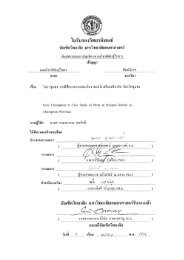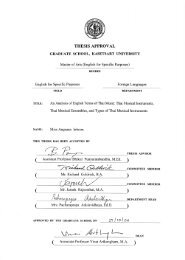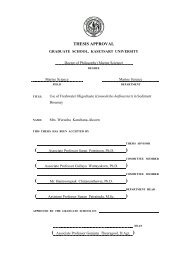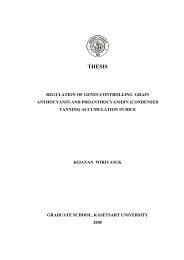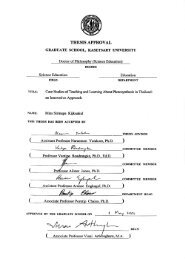THESIS
THESIS
THESIS
You also want an ePaper? Increase the reach of your titles
YUMPU automatically turns print PDFs into web optimized ePapers that Google loves.
6.4.4 Low GI diet on cognitive performance<br />
The Academic Press Dictionary of Science and technology defined<br />
cognition as ‘the mental activity by which an individual is aware of and knows about<br />
his or her environment, including such processes as perceiving, remembering,<br />
reasoning, judging and problem solving’. The brain uses glucose as a main source of<br />
energy. Glycogen brain becomes important only in any metabolic state where supply<br />
transiently cannot meet demand. Such conditions could occur during prolonged focal<br />
activation, sleep deprivation, seizures, and mild hypoxia (Gruetter, 2003).<br />
Under normal circumstances, the brain depends on a continuous<br />
supply of glucose from blood. In adult humans, the brain oxidizes about 120 g of<br />
glucose per day. In general, cognitive performance tasks can be used to examine a<br />
number of skills or abilities concerning the following functions: perception, memory,<br />
attention, arousal, information processing accuracy and speed of movement. Each<br />
function can be evaluated using specialized tests (Bellisle et al. 1998). A number of<br />
studies performed in adults, beginning with the Iowa breakfast studies, have<br />
demonstrated that missing breakfast can have detrimental effects on performance in<br />
terms of reaction-time tasks, spatial memory and immediate word recall (Benton,<br />
1992). While some aspects of memory seem to be susceptible to the effects of missing<br />
breakfast, other aspects of performance are not affected (Smith et al. 1994). Studies in<br />
children and in adolescents have clearly shown deficits in a wide range of<br />
performance tasks following omission of breakfast, with greater effects in under and<br />
malnourished children. A number of studies have shown that breakfast vs. no<br />
breakfast or high- vs. low-energy breakfast causes changes in sustained attention,<br />
reaction time and memory. Energy improves performance in all of these and may be<br />
related to blood glucose levels, with high-carbohydrate meals producing the best<br />
effects (Bellisle et al. 1998). A recent literature review concluded that the<br />
enhancement of cognitive function by incrementing systemic glucose is limited to<br />
relatively complex tasks, and not easy tasks (Benton, 2001).<br />
73



